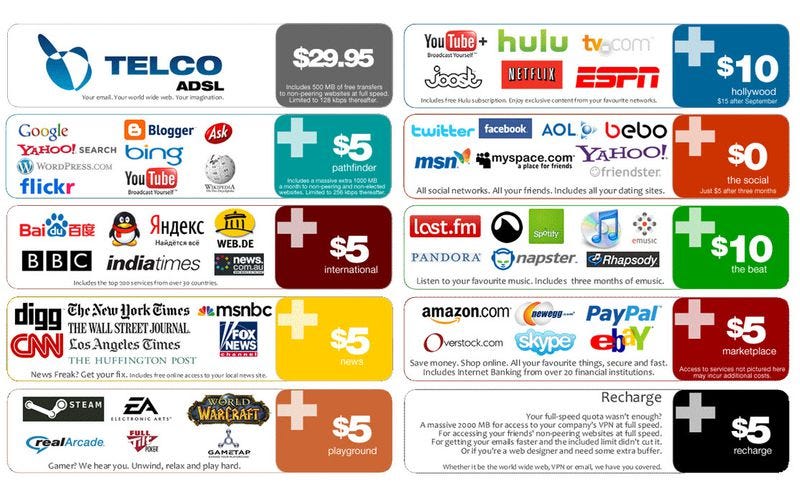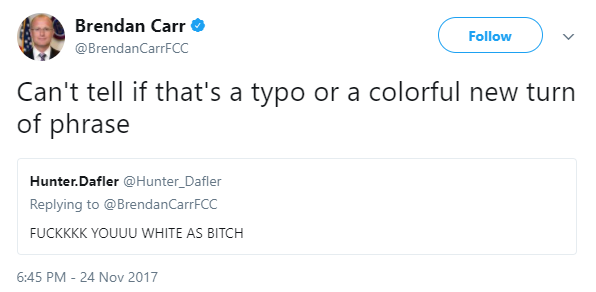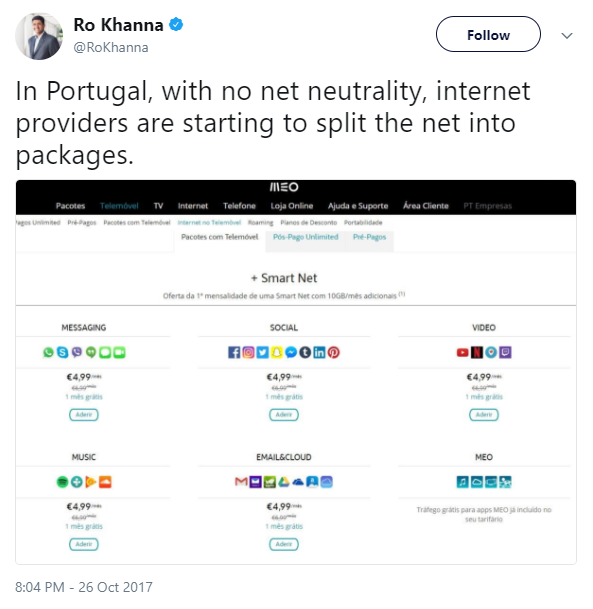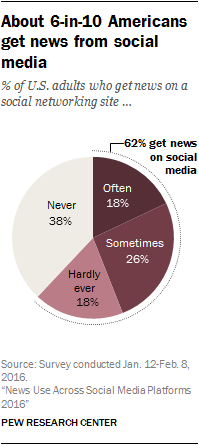Net Neutrality: The Reality
On December 14, the FCC will vote to change the net as we know it. But has the open internet already been destroyed?
On December 14, the FCC will vote to change the net as we know it. But has the open internet already been destroyed?
On December 14th, the Federal Communications Commission will vote on whether to remove Net Neutrality rules installed during the Obama administration.
This vote, spearheaded by FCC chairman and Trump appointee Ajit Pai, will pass.
Don’t get me wrong; like every other responsible person I have been calling the FCC, sending furious emails to the commissioners, grinding my teeth, and weeping over my decades-old DeviantArt account in preparation for this vote. But. It’s gonna pass.
Five FCC commissioners will be voting on this policy change. The two Democrats, Mignon Clyburn and Jessica Rosenworcel, are longstanding Net Neutrality proponents and committed “no” votes. FCC Chairman Ajit Pai is a Republican and former lawyer for Verizon, who’s been gunning for net neutrality since before the “Can you hear me now?” guy from the Verizon commercials was just a glimmer in his parents’ gonads.
Then there’s the other two commissioners. Michael O’Rielly co-wrote an anti-Net-Neutrality article in November— alongside Ted Cruz, who definitely hates the internet for broadcasting his porn viewing history, and who still hasn’t forgiven Tumblr for uncovering his political origins as the Zodiac Killer. The final Commissioner, Brendan Carr, has made numerous appearances on C-SPAN, celebrating the overturning of Net Neutrality. He gleefully retweets all the hate he gets on this issue.
It’s that final piece that has me convinced that no amount of emailing, calling, tweeting, or petitioning will sway the FCC’s three Republican votes. Conservative nerds are not like Trump. They don’t buckle under the slightest suggestion of rejection. They’ve been rejected for being an awkward asshole every day of their lives since they first hit on a girl at a debate competition.
In interviews, Carr and O’Rielly are easygoing, convinced that the public is misguided in its rage. They’re gonna vote yes, and so is Pai, and they’re more than willing to endure the hate messages that come with it.
And while we’re being grimly realistic about the odds of this motion passing, let’s also be clear-eyed and dark-hearted about what the vote really means, too. This vote would undo regulations that were put in place in 2015, which classified the internet as a “common carrier” — that is to say, a public deliverer of goods and information, like bus lines, the postal service, or phone companies.
Public deliverers of public goods are controlled by the FCC. If they are caught discriminating against users — maybe by refusing to let a disabled person on a bus or blocking access to a gay dating app — the FCC investigates and penalizes it.
Rolling back this rule would classify the internet instead as a product, like a cable package, a laptop, or a car, and would place it under the purview of the Federal Trade Commission, the FTC. If AT&T blocked you from accessing a website, you’d report it and have it investigated in much the same way you’d report the Amazon seller who gave you knock-off Amiibos that don’t even work for your Switch.

This policy change has been heralded as the death knell of the internet as we know it. The potential consequences, as people foretell them, are dire. AT&T will be able to offer a cheap, shitty internet plan that only lets you go to Bing.com, Neopets, and Yahoo Answers. Verizon will block you from going to websites with negative reviews of Verizon products. Access to social media sites will be sold in bundles, like cable– 5.99 a month for Snapchat and Instagram, 10.99 extra per month for Tinder and Scruff. Comcast will be able to slow down access to Netflix, forcing you to subscribe to Xfinity Instant.
You’ve probably seen images of what internet access could look like under these rules. Congressman Ro Khanna infamously tweeted an advertisement from a telecom in Portugal, where there is, he said, no net neutrality: the phone company appeared to be charging 4.99 a month to use Skype, 4.99 more to use Facebook and Instagram, an additional 4.99 on top of that for Hulu, Netflix, and Youtube. People were aghast. The image drove people to call the FCC en masse.
There’s one big problem with this forecast of what a world without Net Neutrality would look like: All of these things are already legal right now. Under the current Net Neutrality rules, your internet service provider is allowed to block sites. They are allowed to sell restricted access to a limited number of web services. They are permitted to bundle sites and sell access like cable packages. This has all been legal since the internet’s inception.
The only legal restriction is that if an internet provider does this, they must tell you about it. The few times that the FCC has punished a corporation violating the rules, it’s been for not telling users that they were blocking access. Not for the blocking itself. This would still be the case under the new Net Neutrality rules.
Right now, the only thing keeping AT&T, Comcast, and all the rest from restricting your internet access is — and I really hate to say this phrase without irony — “the invisible hand of the market”. These monopolistic, craven, bloated companies are apparently afraid we’d all ditch home internet access in favor of our phone’s data plans if they blocked our beloved FarmersOnly or FetLife.
Speaking of cell phone data plans, let’s talk about Portugal. Portugal is a member of the EU, which has Net Neutrality. The image that’s been circulating, where the internet in Portugal is being sold in packages, isn’t what it appears to be. The advertisement is for a phone’s unlimited data plan. Customers aren’t having to pay 4.99 a month to be able to access Facebook; they have the option of paying 4.99 a month to get unlimited data on Facebook. All sites are still accessible to all users — you have the option of paying extra for unlimited data for the sites you use most. It still reflects an under-the-table, cronyish deal between social media sites and corporations, but it’s not censorship.
Could we be like Portugal after the FCC’s vote on December 14th? Absolutely. Because we are like that right now. T-Mobile is currently offering users a free Netflix subscription if they sign up for a cell phone plan. AT&T’s unlimited data plan includes access to HBO. Facebook accepts ad revenue from literally any alt-right shitbag who applies, which last year caused all our country-boy dipshit relatives to turn into conspiracy theorists who believe Hillary Clinton runs a pedophilic pizza parlor.
The internet is already pretty fucking tainted. Telcoms, ISPs, social media sites, and cell phone manufacturers are merging and cutting deals all around us, providing users with fewer access options. Internet activity is already deeply centralized, these days, the way cable viewing is. Nearly all user activity is directed to a handful of sites: Facebook, Twitter, Instagram, and Youtube. Those are our news networks, phone lines, and entertainment hubs.
People don’t freely roam small, obscure websites run by individuals or small organizations like they once did. Nearly everyone gets their news from social media posts. Advertisements are subtly embedded in every platform, and rarely labeled properly. Our posts, drafts, and browsing history are logged and sold. We don’t form our own websites or create our own platforms — instead, we give a massive site all our personal information, freely give away our own creative output, and consume poorly regulated advertisements for the privilege of doing so. (Shoutout to Medium.com for making it possible for me to earn money on this piece). All while paying upwards of $60 a month on average for internet access that is slower than what be got for far cheaper elsewhere in the world.
Our internet, here in the US, has always been a mysteriously filtered, biased cesspool poisoned by corporate, monopolistic influence. Internet service providers have attempted to filter, restrict, and sell to us since the days of AOL. But social media platforms have further convinced us to filter, restrict, and sell ourselves. Back in 2015, nearly every major site rallied in support of Obama’s net neutrality policies, and encouraged readers to call the FCC in support of it. In the ensuing two years, many major social media sites have been bought by a corporation that also owns an internet service provider, and are eerily silent on the issue.
Even with Net Neutrality, meaningful internet access will keep getting harder to find. A few regulations won’t protect the open, free internet; that internet has been dying for a long time, and we expedited that death with our own social media habits. To turn this thing around, we’ll need to dismantle the control that large companies have over our internet access, convert the internet into a true public utility that everyone has equal access to, and make the conscious choice, as consumers, to seek out information and filter through it ourselves, rather than having an advertiser algorithm do it for us.
This piece was originally read live as part of The Skewer, a live monthly news revue at Cafe Mustache in Chicago.







